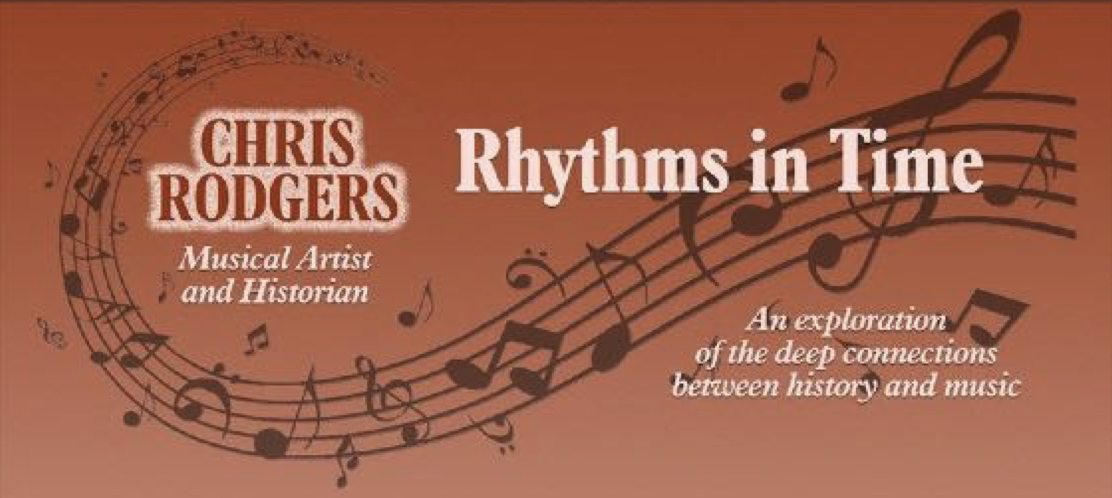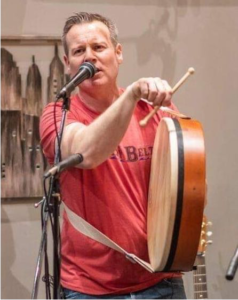Rhythms in Time


~ Report by Myra McFarlane ~
To steal a phrase, and perhaps repurpose slightly “oh what a night!”
RTHS asked Chris Rodgers, local musician and amateur historian, to reflect on how history has influenced his approach to music. We were treated not only to some very personal reflections on the subject, but a mini concert that illustrated each of his points.
Chris began by sharing with us that his guitar was a Canadian made Norman guitar, (pictured here) which for those in the know, is pretty significant. The point is this: like our music, this guitar has a history, and embodies a certain way of life and approach to music. The writer will leave it to those who know more about these things to comment on the significance of the “adjustable neck”.
He then went on to tell us that he likes songs that tell stories about people and that one can get a “glimpse of the past” through music. No kidding! After a rousing rendition of Stompin’ Tom Connors’ Big Joe Mufferaw, Chris went on to tell us the story, and the back story of Josepf Montferrand, a legendary Ottawa Valley lumberjack, on whose story the song was based.

And now came the reflection: Chris posed the question about why history was so important to him, on a personal level. Here in Canada, everyone is from somewhere else, and everybody has a personal story to tell. Chris posits that if we know each others’ backstory, then we are well on the way to the empathy we need in this country. Chris, who spent a year in Scotland, thinks that the Highland Clearances are part of everyone’s history, whether they were born in Scotland or here in Canada. History is personal, and as William Faulkner said, “The past is never dead. It’s never even past”.
Moving forward and eastward on our chronological and geographical timelines, Chris then shared the story behind Farewell to Nova Scotia, which it turns out, is a major crowd pleaser for RTHS members, and that beautifully evokes the anticipation and the dread of a young man going off to the First World War.
A key question in any discussion of music and the arts any art, is how important the literal truth of the matter is. For Gordon Lightfoot, when composing The Wreck of the Edmund Fitzgerald, it would seem to have been very important; so much so that when research came to light after the song was written that called into question the actual time of day of the sinking, Lightfoot actually changed the lyrics in live concerts.
But how important is the “literal truth” in musical representation of historical events? For Chris, it’s important to get the story out. So here is a link to the story of the Nursing Sisters of the Canadian Army Medical Corps, also known as the Bluebirds. https://www.thecanadianencyclopedia.ca/en/article/canadian-army-medical-corpsnursing-sisters
And there is a song, called The Belle of Isle Royale, which tells the story of a nursing sister who is just as heroic as the men we read about, and just may fill a gap in the standard history. Was the Belle a real person? Does it matter? It’s a wonderful representation of what might have happened somewhere. Could it be a local story? If you look at the Spencerville Cenotaph, you will see the name of at least one nursing sister who came back from the war and then died likely of the Spanish Flu, perhaps as she was nursing in a local hospital?
Music is a powerful force - its sounds and rhythms can reach us in ways beyond words, and when nothing else reaches us, often music will, hence the discipline of music therapy, which we see administered in cases of brain injury and often in dementia.
Music is universal and the 12 notes in all of music, and 5 notes excerpted in the pentatonic scale can tell almost any story. But of course, the voice isn’t the only instrument! We were treated to demonstrations of no less than six instruments, and a little about their history - including the bagpipes!
So, some wonderful music, a little folk history, and then what? In preliterate times music was often “the news”. It still functions as “the story” and because it reaches parts of the brain that language cannot, it serves as a powerful catalyst for the feelings that help us preserve our history, perhaps learn from it, and maybe even act on what we have learned.
Chris’s final song was a testament to his point - music can tell the story and get all our cylinders firing so that we are primed to remembrance and possibly action. Think about Wheat Kings, by one of Canada’s folk poet laureates. When you have time, have a listen and tell this writer if you will ever think of David Milgaard and the miscarriage of justice the same way again?
Thank you again, Chris for sharing with us your research, your musical talents and your innate understanding that music makes history accessible, which is what we’re all about here at RTHS.
“Try to imagine life without music. No rock ‘n' roll, no blues, no country, no classical, no rap, no jazz, no folk. No way! Music does not just entertain or refresh us; it also helps to establish who we are. According to ethnomusicologist Bruno Nettl, ‘One cannot really understand a culture without taking into account the almost inevitably great importance of its music.’” (Alex Zukas: Different Drummers: Using Music to Teach History)

